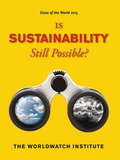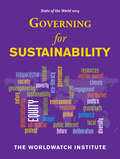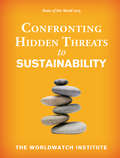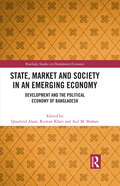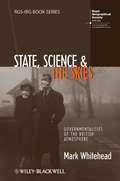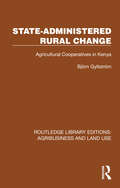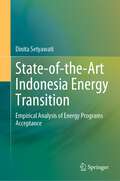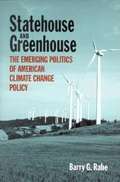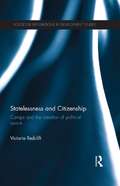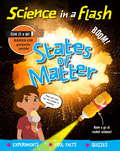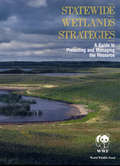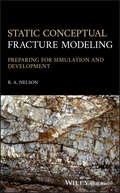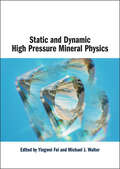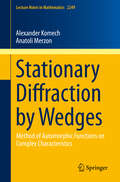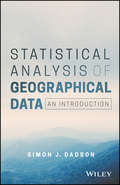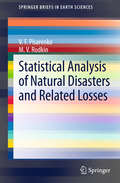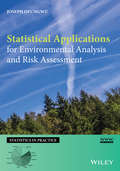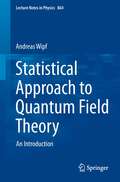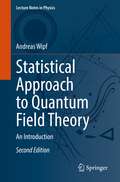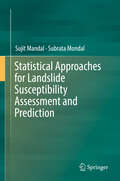- Table View
- List View
State of the World 2013: Is Sustainability Still Possible?
by The Worldwatch InstituteEvery day, we are presented with a range of "sustainable" products and activities--from "green" cleaning supplies to carbon offsets--but with so much labeled as "sustainable," the term has become essentially sustainababble, at best indicating a practice or product slightly less damaging than the conventional alternative. Is it time to abandon the concept altogether, or can we find an accurate way to measure sustainability? If so, how can we achieve it? And if not, how can we best prepare for the coming ecological decline? In the latest edition of Worldwatch Institute's State of the World series, scientists, policy experts, and thought leaders tackle these questions, attempting to restore meaning to sustainability as more than just a marketing tool. In State of the World 2013: Is Sustainability Still Possible?, experts define clear sustainability metrics and examine various policies and perspectives, including geoengineering, corporate transformation, and changes in agricultural policy, that could put us on the path to prosperity without diminishing the well-being of future generations. If these approaches fall short, the final chapters explore ways to prepare for drastic environmental change and resource depletion, such as strengthening democracy and societal resilience, protecting cultural heritage, and dealing with increased conflict and migration flows. State of the World 2013 cuts through the rhetoric surrounding sustainability, offering a broad and realistic look at how close we are to fulfilling it today and which practices and policies will steer us in the right direction. This book will be especially useful for policymakers, environmental nonprofits, and students of environmental studies, sustainability, or economics.
State of the World 2014: Governing for Sustainability (State of the World)
by David W. Orr The Worldwatch Institute Michael Renner Tom Prugh Conor Seyle Matthew Wilburn KingCitizens expect their governments to lead on sustainability. But from largely disappointing international conferences like Rio II to the U.S.'s failure to pass meaningful climate legislation, governments' progress has been lackluster. That's not to say leadership is absent; it just often comes from the bottom up rather than the top down. Action--on climate, species loss, inequity, and other sustainability crises--is being driven by local, people's, women's, and grassroots movements around the world, often in opposition to the agendas pursued by governments and big corporations. These diverse efforts are the subject of the latest volume in the Worldwatch Institute's highly regarded State of the World series. The 2014 edition, marking the Institute's 40th anniversary, examines both barriers to responsible political and economic governance as well as gridlock-shattering new ideas. The authors analyze a variety of trends and proposals, including regional and local climate initiatives, the rise of benefit corporations and worker-owned firms, the need for energy democracy, the Internet's impact on sustainability, and the importance of eco-literacy. A consistent thread throughout the book is that informed and engaged citizens are key to better governance. The book is a clear-eyed yet ultimately optimistic assessment of citizens' ability to govern for sustainability. By highlighting both obstacles and opportunities, State of the World 2014 shows how to effect change within and beyond the halls of government. This volume will be especially useful for policymakers, environmental nonprofits, students of environmental studies, sustainability, or economics--and citizens looking to jumpstart significant change around the world.
State of the World 2015
by The Worldwatch The Worldwatch InstituteWe think we understand environmental damage: pollution, water scarcity, a warming world. But these problems are just the tip of the iceberg. Food insecurity, financial assets drained of value by environmental damage, and a rapid rise in diseases of animal originare among the underreported consequences of an unsustainable global system. In State of the World 2015, the flagship publication of The Worldwatch Institute, experts explore hidden threats to sustainability and howto address them. How will nations deal with migration as climate change refugees cross borders in order to escape flooding, drought, or other extreme weather events? What will happen to the price and availability offossil energy--the foundation of industrial civilization--as these resources oscillate between surplus and scarcity? If perpetual economic growth on a finite planet is impossible, what are the alternatives? Can national governments manage the transition?Eight key issues are addressed in depth,along with the central question ofhow we can develop resilience to these and other shocks. For decades, The Worldwatch Institute has been a leader in identifying and analyzing emerging environmental threats. With the latest edition of State of The World, the authorities at Worldwatch bring to light challenges we can no longer afford to ignore.
State of the World 2015: Confronting Hidden Threats to Sustainability
by The Worldwatch InstituteWe think we understand environmental damage: pollution, water scarcity, a warming world. But these problems are just the tip of the iceberg. Food insecurity, financial assets drained of value by environmental damage, and a rapid rise in diseases of animal originare among the underreported consequences of an unsustainable global system. In State of the World 2015, the flagship publication of The Worldwatch Institute, experts explore hidden threats to sustainability and howto address them. How will nations deal with migration as climate change refugees cross borders in order to escape flooding, drought, or other extreme weather events? What will happen to the price and availability offossil energy--the foundation of industrial civilization--as these resources oscillate between surplus and scarcity? If perpetual economic growth on a finite planet is impossible, what are the alternatives? Can national governments manage the transition?Eight key issues are addressed in depth,along with the central question ofhow we can develop resilience to these and other shocks. For decades, The Worldwatch Institute has been a leader in identifying and analyzing emerging environmental threats. With the latest edition of State of The World, the authorities at Worldwatch bring to light challenges we can no longer afford to ignore.
State, Market and Society in an Emerging Economy: Development and the Political Economy of Bangladesh (Routledge Studies in Development Economics)
by Quamrul Alam Asif M. Shahan Rizwan KhairThe economic and social development that Bangladesh has achieved in the past two decades has made Bangladesh a development paradox. This book tries to explain this paradox through a political economy lens. The book explains the linkages between the state, changing society and emerging private sector, and examines whether the social transformation taking place in Bangladesh has the potential to live up to the expectations of a middle- income country. The early part of the book unravels the myriad relations between the state, society and market to project the aspirations of a newly independent nation. It analyzes how political turmoil, militarization of politics, politicization of institutions, reforms initiatives, industrial and social development policies, and the power nexus influenced the nature of the political economy of Bangladesh. The book goes on to examine how domestic appetite for capital and raw materials, the digital revolution, and the capacity of the local market to absorb expanded economic activities have created an environment that catalyzes innovation and entrepreneurship. The book also explains how the country has attempted to transform from an agrarian to a manufacturing- based economy, with rapid growth in the ready- made garment industry, pisciculture, pharmaceuticals and the ICT sector. Bangladesh’s journey from an emerging economy towards a developed country would interest those researching on development economics and those in policy making.
State, Science and the Skies: Governmentalities of the British Atmosphere (RGS-IBG Book Series #64)
by Mark WhiteheadUtilizing environmental archival materials from the UK, State, Science and the Skies presents a groundbreaking historical account of the development of a state science of atmospheric pollution. Offers the most extensive historical and geographical account of atmospheric government and pollution in Britain, available today Presents archival material from 150 years of British history that represents an original contribution to our knowledge of the history of science and government Develops an innovative combination of Foucauldian history of government with a history of atmospheric science Raises crucial questions about the nature of state/science relations and the conditions under which environmental knowledge is produced
State-Administered Rural Change: Agricultural Cooperatives in Rural Kenya (Routledge Library Editions: Agribusiness and Land Use #12)
by Björn GyllströmOriginally published in 1991, this book includes a detailed case study of Kenya’s co-operative movement – one of the largest in sub-Saharan Africa. Co-operatives have been given a major role in rural development strategies in both socialist and capitalist states. However in both context the results they have achieved have fallen short of expectations. The book focuses on specific elements of the institutional setting within which agricultural marketing co-operatives operate. Factors like land tenure, market regulations, co-operative legislation and direct development support are discussed and shown to have had dire effects on the managerial behaviour and social impact of the co-operative sector.
State-of-the-Art Indonesia Energy Transition: Empirical Analysis of Energy Programs Acceptance
by Dinita SetyawatiThis book discusses how people can come together to address current energy justice and access poverty problems by examining the relationship between energy systems and society in diverse energy sources. The novelty of this book is that this is the only complete guide for readers who wish to understand the status of Indonesia’s energy transition and renewable energy development. Energy programs that are explored are the ones prioritized by government administrations, including coal, nuclear power, solar energy, green electricity, and geothermal energy. Based on extensive fieldwork and empirical data, the book combines insights from historical data on energy subsidies and economic diversification, current empirical data on social acceptance of new energy technologies, and contemporary studies that forecast the implications of the transition to the coal industry and fossil fuel subsidies. It asks how Indonesia has enacted policies that support energy transition. How do the public and civil society view those policies? What are the implications for broader themes and discussions on energy sources, technology, systems, policies, and service? Strategies are suggested to advance a sustainable transition in the developing world that will mitigate developmental risks associated with the transition away from fossil fuels while encouraging decision making in a sustainable and socially just manner. This book is an informative and engaging read for a general audience as well as a valuable resource for scholars, researchers, and students in environmental and energy studies.
Statehouse and Greenhouse: The Emerging Politics of American Climate Change Policy
by Barry G. RabeNo environmental issue triggers such feelings of hopelessness as global climate change. Many areas of the world, including regions of the United States, have experienced a wide range of unusually dramatic weather events recently.
Statelessness and Citizenship: Camps and the Creation of Political Space (Routledge Explorations in Development Studies)
by Victoria RedcliftWhat does it mean to be a citizen? In depth research with a stateless population in Bangladesh has revealed that, despite liberal theory’s reductive vision, the limits of political community are not set in stone. The Urdu-speaking population in Bangladesh exemplify some of the key problems facing uprooted populations and their experience provides insights into the long term unintended consequences of major historical events. Set in a site of camp and non-camp based displacement, it illustrates the nuances of political identity and lived spaces of statelessness that Western political theory has too long hidden from view. Using Bangladesh as a case study, Statelessness and Citizenship: Camps and the creation of political space argues that the crude binary oppositions of statelessness and citizenship are no longer relevant. Access to and understandings of citizenship are not just jurally but socially, spatially and temporally produced. Unpicking Agamben’s distinction between ‘political beings’ and ‘bare life’, the book considers experiences of citizenship through the camp as a social form. The camps of Bangladesh do not function as bounded physical or conceptual spaces in which denationalized groups are altogether divorced from the polity. Instead, citizenship is claimed at the level of everyday life, as the moments in which formal status is transgressed. Moreover, once in possession of ‘formal status’ internal borders within the nation-state render ‘rights-bearing citizens’ effectively ‘stateless’, and the experience of ‘citizens’ is very often equally uneven. While ‘statelessness’ may function as a cold instrument of exclusion, certainly, it is neither fixed nor static; just as citizenship is neither as stable nor benign as the dichotomy would suggest. Using these insights, the book develops the concept of ‘political space’ – an analysis of the way history and space inform the identities and political subjectivity available to people. In doing so, it provides an analytic approach of relevance to wider problems of displacement, citizenship and ethnic relations.Shortlisted for this year’s BSA Philip Abrams Memorial Prize.
States of Matter: Rocks Science ... In A Flash: Rocks (Science in a Flash #35)
by Georgia Amson-BradshawHelp kids discover science - in a flash!What's the matter? Are you in a state over evaporation and condensation? Don't worry - this book will give you the low-down on liquids, a summary about solids and the goods on gases ... and more!This essential KS2 series for children aged 7 and up covers all the key science topics in energetic, quick-fire way, aiding clear comprehension by getting straight to the point! Each spread starts with a 'flash' or headline, summing-up succinctly the science information to follow. Attractive and light-hearted illustration visually conveys the information, adding depth and detail to engage children. Also includes fun jokes and cartoons to keep even the most reluctant readers entertained.
Statewide Wetlands Strategies: A Guide To Protecting And Managing The Resource
by Mark Rorner World Wildlife FundStatewide Wetlands Strategies offers comprehensive strategies that draw upon all levels of government and the private sector to focus and coordinate efforts to work toward the goal of no-net-loss of wetlands.
Static Conceptual Fracture Modeling: Preparing for Simulation and Development
by Ronald A. NelsonModelling of flow in naturally fractured reservoirs is quickly becoming mandatory in all phases of oil and gas exploration and production. Creation of a Static Conceptual Fracture Model (SCFM) is needed as input to create flow simulations for today and for prediction of flow into the future. Unfortunately, the computer modelers tasked with constructing the gridded fracture model are often not well versed in natural fracture characterization and are often forced to make quick decisions as to the input required by the software used to create these models. Static Conceptual Fracture Modelling: Preparing for Simulation and Development describes all the fracture and reservoir parameters needed to create the fracture database for effective modelling and how to generate the data and parameter distributions. The material covered in this volume highlights not only natural fracture system quantification and formatting, but also describes best practices for managing technical teams charged with creating the SCFM. This book will become a must on the shelf for all reservoir modelers.
Static and Dynamic High Pressure Mineral Physics
by Michael J. Walter Yingwei FeiHigh pressure mineral physics is a field that has shaped our understanding of deep planetary interiors and revealed new material phenomena occurring at extreme conditions. Comprised of sixteen chapters written by well-established experts, this book covers recent advances in static and dynamic compression techniques and enhanced diagnostic capabilities, including synchrotron X-ray and neutron diffraction, spectroscopic measurements, in situ X-ray diffraction under dynamic loading, and multigrain crystallography at megabar pressures. Applications range from measuring equations of state, elasticity, and deformation of materials at high pressure, to high pressure synthesis, thermochemistry of high pressure phases, and new molecular compounds and superconductivity under extreme conditions. This book also introduces experimental geochemistry in the laser-heated diamond-anvil cell enabled by the focused ion beam technique for sample recovery and quantitative chemical analysis at submicron scale. Each chapter ends with an insightful perspective of future directions, making it an invaluable source for graduate students and researchers.
Statics and Dynamics of Weakly Coupled Antiferromagnetic Spin-1/2 Ladders in a Magnetic Field
by Pierre BouillotThis thesis shows how a combination of analytic and numerical techniques, such as a time dependent and finite temperature Density Matrix Renormalization Group (DMRG) technique, can be used to obtain the physical properties of low dimensional quantum magnets with an unprecedented level of accuracy. A comparison between the theory and experiment then enables these systems to be used as quantum simulators; for example, to test various generic properties of low dimensional systems such as Luttinger liquid physics, the paradigm of one dimensional interacting quantum systems. Application of these techniques to a material made of weakly coupled ladders (BPCB) allowed the first quantitative test of Luttinger liquids. In addition, other physical quantities (magnetization, specific heat etc.), and more remarkably the spins-spin correlations - directly measurable in neutron scattering experiments - were in excellent agreement with the observed quantities. We thus now have tools to quantitatiively assess the dynamics for this class of quantum systems.
Stationary Diffraction by Wedges: Method of Automorphic Functions on Complex Characteristics (Lecture Notes in Mathematics #2249)
by Alexander Komech Anatoli MerzonThis book presents a new and original method for the solution of boundary value problems in angles for second-order elliptic equations with constant coefficients and arbitrary boundary operators. This method turns out to be applicable to many different areas of mathematical physics, in particular to diffraction problems in angles and to the study of trapped modes on a sloping beach. Giving the reader the opportunity to master the techniques of the modern theory of diffraction, the book introduces methods of distributions, complex Fourier transforms, pseudo-differential operators, Riemann surfaces, automorphic functions, and the Riemann–Hilbert problem. The book will be useful for students, postgraduates and specialists interested in the application of modern mathematics to wave propagation and diffraction problems.
Statistical Analysis in Climate Research
by Hans Von Storch Francis W. ZwiersClimatology is, to a large degree, the study of the statistics of our climate. The powerful tools of mathematical statistics therefore find wide application in climatological research. The purpose of this book is to help the climatologist understand the basic precepts of the statistician's art and to provide some of the background needed to apply statistical methodology correctly and usefully. The book is self contained: introductory material, standard advanced techniques, and the specialised techniques used specifically by climatologists are all contained within this one source. There are a wealth of real-world examples drawn from the climate literature to demonstrate the need, power and pitfalls of statistical analysis in climate research. Suitable for graduate courses on statistics for climatic, atmospheric and oceanic science, this book will also be valuable as a reference source for researchers in climatology, meteorology, atmospheric science, and oceanography.
Statistical Analysis of Climate Extremes
by Manfred MudelseeThe risks posed by climate change and its effect on climate extremes are an increasingly pressing societal problem. This book provides an accessible overview of the statistical analysis methods which can be used to investigate climate extremes and analyse potential risk. The statistical analysis methods are illustrated with case studies on extremes in the three major climate variables: temperature, precipitation, and wind speed. The book also provides datasets and access to appropriate analysis software, allowing the reader to replicate the case study calculations. Providing the necessary tools to analyse climate risk, this book is invaluable for students and researchers working in the climate sciences, as well as risk analysts interested in climate extremes.
Statistical Analysis of Geographical Data: An Introduction
by Simon James DadsonStatistics Analysis of Geographical Data: An Introduction provides a comprehensive and accessible introduction to the theory and practice of statistical analysis in geography. It covers a wide range of topics including graphical and numerical description of datasets, probability, calculation of confidence intervals, hypothesis testing, collection and analysis of data using analysis of variance and linear regression. Taking a clear and logical approach, this book examines real problems with real data from the geographical literature in order to illustrate the important role that statistics play in geographical investigations. Presented in a clear and accessible manner the book includes recent, relevant examples, designed to enhance the reader’s understanding.
Statistical Analysis of Natural Disasters and Related Losses
by V. F. Pisarenko M. V. RodkinThe study of disaster statistics and disaster occurrence is a complicated interdisciplinary field involving the interplay of new theoretical findings from several scientific fields like mathematics, physics, and computer science. Statistical studies on the mode of occurrence of natural disasters largely rely on fundamental findings in the statistics of rare events, which were derived in the 20th century. With regard to natural disasters, it is not so much the fact that the importance of this problem for mankind was recognized during the last third of the 20th century - the myths one encounters in ancient civilizations show that the problem of disasters has always been recognized - rather, it is the fact that mankind now possesses the necessary theoretical and practical tools to effectively study natural disasters, which in turn supports effective, major practical measures to minimize their impact. All the above factors have resulted in considerable progress in natural disaster research. Substantial accrued material on natural disasters and the use of advanced recording techniques have opened new doors for empirical analysis. However, despite the considerable progress made, the situation is still far from ideal. Sufficiently complete catalogs of events are still not available for many types of disasters, and the methodological and even terminological bases of research need to be further developed and standardized. The present monograph summarizes recent advances in the field of disaster statistics, primarily focusing on the occurrence of disasters that can be described by distributions with heavy tails. These disasters typically occur on a very broad range of scales, the rare greatest events being capable of causing losses comparable to the total losses of all smaller disasters of the same type. Audience: This SpringerBrief will be a valuable resource for those working in the fields of natural disaster research, risk assessment and loss mitigation at regional and federal governing bodies and in the insurance business, as well as for a broad range of readers interested in problems concerning natural disasters and their effects on human life.
Statistical Applications for Environmental Analysis and Risk Assessment
by Joseph OfungwuStatistical Applications for Environmental Analysis and Risk Assessment guides readers through real-world situations and the best statistical methods used to determine the nature and extent of the problem, evaluate the potential human health and ecological risks, and design and implement remedial systems as necessary. Featuring numerous worked examples using actual data and "ready-made" software scripts, Statistical Applications for Environmental Analysis and Risk Assessment also includes:* Descriptions of basic statistical concepts and principles in an informal style that does not presume prior familiarity with the subject* Detailed illustrations of statistical applications in the environmental and related water resources fields using real-world data in the contexts that would typically be encountered by practitioners* Software scripts using the high-powered statistical software system, R, and supplemented by USEPA's ProUCL and USDOE's VSP software packages, which are all freely available* Coverage of frequent data sample issues such as non-detects, outliers, skewness, sustained and cyclical trend that habitually plague environmental data samples* Clear demonstrations of the crucial, but often overlooked, role of statistics in environmental sampling design and subsequent exposure risk assessment.
Statistical Approach to Quantum Field Theory
by Andreas WipfOver the past few decades the powerful methods of statistical physics and Euclidean quantum field theory have moved closer together, with common tools based on the use of path integrals. The interpretation of Euclidean field theories as particular systems of statistical physics has opened up new avenues for understanding strongly coupled quantum systems or quantum field theories at zero or finite temperatures. Accordingly, the first chapters of this book contain a self-contained introduction to path integrals in Euclidean quantum mechanics and statistical mechanics. The resulting high-dimensional integrals can be estimated with the help of Monte Carlo simulations based on Markov processes. The most commonly used algorithms are presented in detail so as to prepare the reader for the use of high-performance computers as an "experimental" tool for this burgeoning field of theoretical physics. Several chapters are then devoted to an introduction to simple lattice field theories and a variety of spin systems with discrete and continuous spins, where the ubiquitous Ising model serves as an ideal guide for introducing the fascinating area of phase transitions. As an alternative to the lattice formulation of quantum field theories, variants of the flexible renormalization group methods are discussed in detail. Since, according to our present-day knowledge, all fundamental interactions in nature are described by gauge theories, the remaining chapters of the book deal with gauge theories without and with matter. This text is based on course-tested notes for graduate students and, as such, its style is essentially pedagogical, requiring only some basics of mathematics, statistical physics, and quantum field theory. Yet it also contains some more sophisticated concepts which may be useful to researchers in the field. Each chapter ends with a number of problems - guiding the reader to a deeper understanding of some of the material presented in the main text - and, in most cases, also features some listings of short, useful computer programs.
Statistical Approach to Quantum Field Theory: An Introduction (Lecture Notes in Physics #992)
by Andreas WipfThis new expanded second edition has been totally revised and corrected. The reader finds two complete new chapters. One covers the exact solution of the finite temperature Schwinger model with periodic boundary conditions. This simple model supports instanton solutions – similarly as QCD – and allows for a detailed discussion of topological sectors in gauge theories, the anomaly-induced breaking of chiral symmetry and the intriguing role of fermionic zero modes. The other new chapter is devoted to interacting fermions at finite fermion density and finite temperature. Such low-dimensional models are used to describe long-energy properties of Dirac-type materials in condensed matter physics. The large-N solutions of the Gross-Neveu, Nambu-Jona-Lasinio and Thirring models are presented in great detail, where N denotes the number of fermion flavors. Towards the end of the book corrections to the large-N solution and simulation results of a finite number of fermion flavors are presented. Further problems are added at the end of each chapter in order to guide the reader to a deeper understanding of the presented topics. This book is meant for advanced students and young researchers who want to acquire the necessary tools and experience to produce research results in the statistical approach to Quantum Field Theory.
Statistical Approaches for Landslide Susceptibility Assessment and Prediction
by Sujit Mandal Subrata MondalThis book focuses on the spatial distribution of landslide hazards of the Darjeeling Himalayas. Knowledge driven methods and statistical techniques such as frequency ratio model (FRM), information value model (IVM), logistic regression model (LRM), index overlay model (IOM), certainty factor model (CFM), analytical hierarchy process (AHP), artificial neural network model (ANN), and fuzzy logic have been adopted to identify landslide susceptibility. In addition, a comparison between various statistical models were made using success rate cure (SRC) and it was found that artificial neural network model (ANN), certainty factor model (CFM) and frequency ratio based fuzzy logic approach are the most reliable statistical techniques in the assessment and prediction of landslide susceptibility in the Darjeeling Himalayas. The study identified very high, high, moderate, low and very low landslide susceptibility locations to take site-specific management options as well as to ensure developmental activities in theDarjeeling Himalayas.Particular attention is given to the assessment of various geomorphic, geotectonic and geohydrologic attributes that help to understand the role of different factors and corresponding classes in landslides, to apply different models, and to monitor and predict landslides. The use of various statistical and physical models to estimate landslide susceptibility is also discussed. The causes, mechanisms and types of landslides and their destructive character are elaborated in the book. Researchers interested in applying statistical tools for hazard zonation purposes will find the book appealing.
